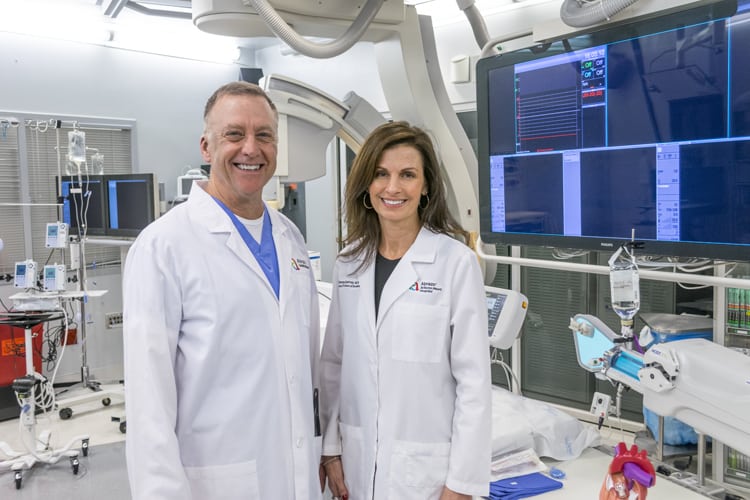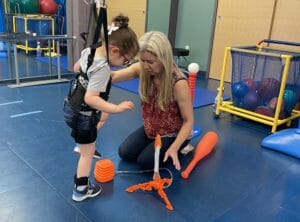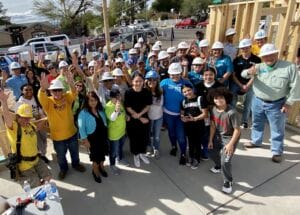Abrazo Arizona Heart Hospital was a center of innovation before anyone knew enough to use the trendy term.
The hospital was founded in 1998 by Dr. Edward “Ted” Diethrich, the brilliant and innovative cardiac surgeon who gained acclaim by becoming the first doctor to perform open-heart surgery on live television and also showing footage of then-U.S. Sen. Barry Goldwater’s beating heart after removing blockage from the political icon’s arteries.
“Ted Diethrich has been looked upon nationally and internationally as a thought leader, as a pioneer and as an innovator,” says Dr. Timothy Byrne, market medical director of interventional cardiology at Abrazo Community Health Network and the man to whom Diethrich passed the torch at Arizona Heart Hospital. “The goal of the Heart Hospital will always be to be part of the type of environment that Ted Diethrich established.”
Diethrich died in 2017 at 81.
Now celebrating its 20th anniversary, Arizona Heart Hospital has served as the area’s leading hospital for the diagnosis and treatment of heart and vascular disease. The hospital has distinguished itself as one of the nation’s top 100 cardiovascular hospitals, recognized for surgical performance, clinical efficiencies, and better patient outcomes. The hospital was acquired by Abrazo Community Health Network (then a subsidiary of Vanguard Health Systems) in 2010.
“While Dr. Diethrich faced some criticism early in his career because the things he was doing were so innovative and different from anything that had ever been done before, he became highly respected around the world,” Dr. Byrne says. “You cannot go anywhere — a hospital in London, a conference in Paris, a university in Asia — where Ted Diethrich isn’t thought about, discussed and praised for what he’s done for medicine.”
The same can be said for the hospital he founded.
“Today, the spirit of innovation that Dr. Diethrich created is alive because we are a destination center for aortic disease thanks to people like Dr. Venkatesh Ramaiah, who is a thought leader, international speaker and an amazingly talented vascular surgeon who has advanced the space and taken the baton from Dr. Diethrich,” Dr. Byrne says.
Dr. Ramaiah, the medical director of the Arizona Heart Hospital, specializes in endovascular and vascular surgery. He treats conditions such as complications with blood vessels and intervenes to prevent aneurysms and heart attacks. He also conducts endovascular research at the Arizona Heart Institute.
“When I saw what they were doing here, I was blown away,” Dr. Ramaiah says. “Not only is Arizona Heart Institute involved in cutting-edge technology in terms of procedures, but also in terms of patient care and research. Everything here is centered around cardiovascular disease and I haven’t seen another ‘one-stop shop’ for cardiac care that’s so advanced.”
Among the advancements that have helped Arizona Heart Hospital develop best-of-class methods for every area of cardiac care is the creation of six institutes specializing in the comprehensive treatment of heart disease:
• Institute for Advanced Aortic Disease
• Institute for Cardiac Arrhythmias
• Institute for Congestive Heart Failure
• Institute for Coronary Artery Disease
• Institute for Peripheral Vascular Disease
• Institute for Valvular Diseases
On the structural heart side of the medical equation, Dr. Byrne says his team is playing to its innovative roots through cutting-edge clinical research. The hospital’s physicians are currently serving as principal or sub-investigators for more than two dozen national clinical trials on everything from complex heart valve replacements to aortic aneurysms to an irregular heartbeat and heart failure.
“We want to be a destination center where we can take care of sick people in a forward-thinking, patient-centered approach, where we treat patients and their families in the best ways we can,” Dr. Byrne says. “That’s what makes us unique and special. At the end of the day, we don’t just take care of sick people, we take care of sick people and everyone who loves those sick people.”
While the pioneering and innovative spirit still defines Abrazo Arizona Heart Hospital, it’s the addition of the human spirit that has taken the healthcare facility to a new level.
“While we know it’s important to participate in innovation and to pioneer new clinical trials and new devices that we can bring to market,” Dr. Byrne says, “taking care of sick people in the right way is just as important.”
Game changers
Abrazo Arizona Heart Hospital is performing game-changing, minimally invasive procedures that could help patients live longer and better. Among them are:
• Transcatheter Aortic Valve Replacement (TAVR), a minimally invasive procedure and a promising alternative to open-heart surgery for the estimated 1.5 million Americans with aortic stenosis. This is significantly less invasive than the traditional aortic valve surgery. Abrazo Arizona Heart Hospital is one of 80 hospitals nationwide to participate in a national trial that ultimately has helped expand the procedure to more patients.
• CardioMEMS, an electronic sensor the size of a paperclip, that could help the nearly six million Americans with heart failure. The CardioMEMS device is implanted through a catheter in the pulmonary artery that carries blood from the heart to the lungs to detect small changes in the heart pressure. Once at home, the CardioMEMS patient uses a portable electronic unit and a special pillow containing an antenna to take daily sensor readings from the implanted device. Physicians review the readings and can make necessary modifications to the patient’s medications, allowing for personalized and proactive management to reduce the likelihood of hospitalization.
• Transcarotid Arterial Revascularization, or TCAR, is designed to lower the risk of a stroke or heart attack for the estimated 300,000 people in the United States diagnosed with blockages or plaque in their carotid artery, which is the major blood vessel in the neck that supplies blood to the brain, neck and face. The minimally invasive procedure enables doctors to make a tiny incision at the precise spot of the neck where the blockage occurs using a thin, flexible wire and results in a lower risk for a stroke or heart attack and a quicker recovery.
• Watchman, a stroke-preventing device for people with A-Fib (an irregular heartbeat). Watchman, which is about the size of a quarter, allows doctors to help patients with A-Fib get off of blood thinners and resume an active lifestyle. Abrazo was part of the Watchman clinical trial and the FDA approved the device in 2015.




